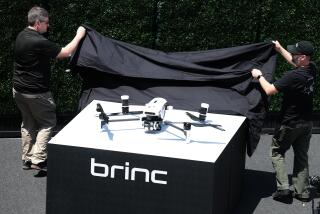Will drone racing fly as a sport?
Imagine careening through the forest chasing Stormtroopers on speeder bikes as Luke Skywalker and Princess Leia did in a famous scene from “Star Wars,” flying around trees and ducking under branches.
A group of drone operators created that sensation for Internet viewers when they recently raced their camera-equipped robotic quadcopters through a forest. The video went viral.
It is that virtual reality experience of sitting inside the small flying machine’s cockpit that convinced Stephen Ross, the owner of the Miami Dolphins, and his business partner that drone racing could be the next big global sport.
A few months ago, Ross’ New York investment firm, RSE Ventures, bankrolled a start-up called Drone Racing League to work on turning what is now little more than an underground hobby for enthusiastic drone geeks into a profitable business.
With Ross’ initial funding of $1 million, the drone league experimented with its concept this summer by gathering a small group of quadcopter pilots to race their machines through an abandoned century-old power plant in Yonkers, N.Y.
The small helicopter-like drones sped around the course set up inside the industrial hulk, flying through doors — while avoiding the obstacles of the plant’s remaining rusty equipment — at speeds as fast as a car.
Drone Racing League founder Nick Horbaczewski said he plans to organize drone races anywhere birds have a fascinating view: from jungles to parking garages to historical landmarks.
“The opportunities are endless,” said Horbaczewski, 34.
The league plans to make money the same way any sports business would, including through sponsorships, media deals and eventually ticket sales.
“While it’s very early,” said Matt Higgins, who founded RSE Ventures with Ross, “it has all the makings of a future sport.”
Drone racing as a hobby was sparked when manufacturers added video cameras to their robotic quadcopters, which are often roughly the size of a pizza.
Pilots wear goggles that give them the drones’ perspective of the race course, calling it “first-person view,” or FPV racing.
But the pastime really took off in the last year as the drones became more sophisticated with better controls, said Ryan Gury, 32, who works for the league designing drones and race courses.
“Before it was almost like you didn’t have the steering wheel tightened,” Gury said. “Now you have laser-sharp response rates.”
Gury said racing a drone makes you feel as if you can defy gravity.
“You have this ridiculous connection to it,” he said. “It feels like you are a superhero.”
Ross, a real estate developer, and Higgins created RSE Ventures in 2012 with the intention of being on the vanguard of sports entertainment. Using technology to improve the experience of fans has been one of their key focuses.
Higgins said one of his 30-something employees brought the idea of drone racing to him earlier this year.
“I stayed up all night,” he said, “and watched every drone racing video I could find on the Internet.”
He said he was taken by the fervor of the hobbyist racers.
“This is about taking that passion,” he said, “and turning it into a sport.”
Higgins said he believes the sport can quickly find a place on television because of the take-you-there video that the drones’ cameras create.
He said it will be harder to make it a spectator sport. But he points to the success that Twitch, the streaming service, has had with professional video gaming.
On Twitch, fans watch video gamers play as they listen to commentary from announcers. The company says it now has more than 100 million unique views each month. Twitch, now owned by Amazon, has also co-sponsored video game tournaments that have filled spaces the size of the theater at Madison Square Garden.
Horbaczewski, the league’s founder, said he believes he can make drone racing popular with spectators by allowing the crowd to wear goggles or watch immersive video screens that put them inside the drone.
“Who doesn’t want to feel like they are flying,” said Higgins, who describes drone racing as “Twitch meets Formula One.”
The league spent a day testing drones at an event in Los Angeles early this summer, Horbaczewski said.
He said the company doesn’t yet have a race scheduled for California, but employees are excited about creating courses there.
“We’ll be in California,” he said.
The league won’t be the first to try to fill an arena with drone racing fans in the Southland.
In July, the first National Drone Racing Championship was held at a stadium at the California State Fair in Sacramento.
Scot Refsland, who directed the race, said part of his motivation was to show the public that drones were not the menacing spying machines that many believed.
“Drone racing had never been put in a big stadium like that,” Refsland said. “Up until now, it had been a bunch of guys getting together in a field and flying.”
Refsland said it was the first drone race approved by the Federal Aviation Administration, which currently has banned the commercial flying of the robot-like machines until safety regulations are approved.
He said organizers put up nets to ensure the drones didn’t soar into the crowd.
“We didn’t have any major fly-aways,” he said.
The event was lightly attended, but Refsland said interest in drone racing is skyrocketing.
He said he’s already planning the World Championship in Hawaii for next year. That race will have a purse of $100,000 — four times the prize in Sacramento, he said.
Refsland said the sport is morphing constantly as operators use 3-D printers to redesign their machines and instantly manufacture new parts.
The investment from RSE has only added to the excitement, he said. “We’re in a hyper, hyper market.”
More to Read
Inside the business of entertainment
The Wide Shot brings you news, analysis and insights on everything from streaming wars to production — and what it all means for the future.
You may occasionally receive promotional content from the Los Angeles Times.











